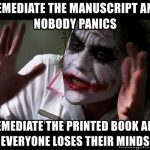A question that is a continual theme throughout the Engell and O’Donnell podcast is what is the next frontier and how do we respond to it? What does the future hold and how do we cope with the use of digital technologies for writing and education. The written word in a tradition framework had the power to spread one’s ideas beyond your immediate locality (Engell & O’Donnell). Theological orthodoxy was thrown into turmoil when Christianity came on the scene, as it passed it’s teachings through a book and allowed people to bond together through the written word. In our present day digital context the written word can pass much farther and reach a broader audience through virtual space. This brings us to education, for centuries the center of knowledge for students has been the textbook and the authority that is projected by that text. Built up to such a high point that it “function(s) in such a way as to build fences around . . . privileged material,” (Scholes, 1992, p. 144). The keeper of this knowledge has always been the teacher who is expected to obtain a deep understanding of the text and to impart his/her knowledge onto the students. This role as gatekeeper of all knowledge is now changing as digital storage and dissemination of the text has been forever altered by technology.
James Engle talks about “The changing role of student and teacher” (Engell & O’Donnell, 1999). He states “Most students in higher education tend to be more or as literate as many of their professors” (Engell & O’Donnell, 1999). This can also hold true for K-12 education. If a student can code a computer to do their bidding or display their presentation with multimedia that the teacher has no idea how to use is there a role reversal? As information becomes more readily available to both teacher and students does the teacher still hold the coveted position as keeper of all knowledge? Or perhaps does the role of the teacher need to shift to become a guide of sorts, one who helps their students scaffold and navigate the endless sea of ones and zeros that has become our great open textbook. Of course a child does not have the same level of executive functioning as a teacher but is technology forever altering our traditional sense of how knowledge is gained or transferred?
An audience member asked a very thought provoking question about the creation of codex to replace papyrus as a leap in information technology. O’Donnell talks about how if you did not transfer your writing from papyrus to codex the information you had created would never have an audience. Looking at this in the K-12 system our new BC curriculum has completely removed textbooks from is curriculum standards. This is important to consider when we think about where now do teachers seek information to teach their students. Teachers do not have a prescribed guidebook to follow anymore, where they retrieve their instructional pieces is completely open. While this does allow for more flexibility for experienced teachers to choose their path a new teacher might be intimidated and overwhelmed with no guide to follow. As the book “Technopoly: The Surrender of Culture to Technology” states ”technology giveth and technology taketh away” (Postman, p.4). With this vast open resource those who can navigate and manipulate the digital information realm will be in a higher position of power while those who cannot may be left behind. As well what we gain with a broader sense of community we lose with a localised sense of intimacy, or face to face contact. The podcast tells us that the frontier is forever changing and there is no clear choice, right or wrong just a muddled set of choices and results, do not be hypnotized by technologies gains or paralyzed by its threats(Engell & O’Donnell).
References
Engell, J. (Presenter) & O’Donnell, J. (Presenter). (1999). From Papyrus to Cyberspace [radio broadcast]. Retrieved from https://canvas.ubc.ca/courses/4290/files/609973/preview
Postman, N. (1993). Technopoly: The surrender of culture to technology. New York: Vintage Books.
Scholes, Robert. (1992). Canonicity and textuality, In J. Gibaldi (Ed.), Introduction to scholarship in modern languages and literatures (138-158). New York: MLA, 1992.



Kathryn Williams
May 30, 2018 — 2:29 am
You’ve brought up some excellent points and touched on concepts that are vitally important to think about as we move forward in this internet and technology rich time. Personally, as an elementary school teacher, I find the idea of the teacher no longer being the sole keeper of knowledge to be a breath of fresh air! Although letting go of control can be difficult, and something that I must continue to push myself to do, the idea that the students and teachers learn through increasingly collaborative methods is exciting. As you mentioned, students often are more literate in certain ways than their teachers. I’ve experienced this when working on a coding program Scratch. If I limited the students do work based on only what I taught them, their work would be rather limited and I would be stifling their potential. This shift that technology has created, however, does rely heavily on having teachers who are comfortable with change; teachers who don’t want to rely heavily on one textbook to contain all knowledge about a course. What happens when teachers are reluctant to accept that they are not the, as you so eloquently put it, “gatekeeper of all knowledge?”
As you mention, Postman claims that “technology giveth and technology taketh away” (1993, p.4). This theme was mentioned again by James O’Donnell when he argued that technological innovation will always result in both loses and gains (Engell & O’Donnell, 1999). Perhaps the role of the teacher is shifting away from sole possessor of knowledge. Could it be that a part of our new role is to ensure that students have an awareness of the benefits and drawbacks of technology?
Thanks
Kathryn
References
Engell, J. (Presenter) & O’Donnell, J. (Presenter). (1999). From Papyrus to Cyberspace [radio broadcast]. Retrieved from https://canvas.ubc.ca/courses/4290/files/609973/preview
Postman, N. (1993). Technopoly: The surrender of culture to technology. New York: Vintage Books.